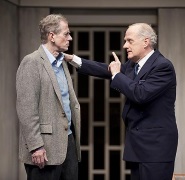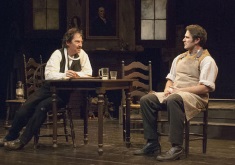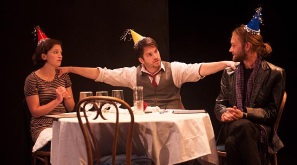Theater in the Berkshires used to be a strictly summer affair, but in recent years three of the four major companies (Williamstown being the exception) have extended their hot-weather seasons into the fall and even winter, joined by upstart troupes/companies like WAM Theatre, which opens its fifth season this month with Winter Miller’s In Darfur.
Over the years, each of the three biggies has developed a distinctive approach to foliage-season fare. Shakespeare & Company goes in for spoof thrillers like The 39 Steps and this year’s Private Eyes. The Berkshire Theatre Group, while continuing its concert series at Pittsfield’s Colonial Theatre, stocks its intimate Unicorn Theatre in Stockbridge with small-cast pieces, many of them new plays, like this month’s Poe. And Barrington Stage Company has begun mounting large-cast, mainstage works on social issues, like last year’s Clybourne Park and the current An Enemy of the People, playing through this weekend.
Watching Arthur Miller’s adaptation of that Ibsen drama, in Julie Boyd’s riveting production at Barrington Stage, I couldn’t help thinking of The Crucible, Miller’s great metaphor of public insanity and personal courage. He adapted An Enemy of the People in 1950, three years before The Crucible, when postwar euphoria had given way to anticommunist hysteria across the U.S. In many ways, Miller taking up Ibsen’s portrait of a good man brought down by corrupt self-interest seemed to me like notes for the later play. Where The Crucible is about a small, insular community in the grip of religious hysteria, Enemy is about a small, insular community in the grip of local politics turned nasty. But both plays revolve around a public swept up in a lie they can’t acknowledge and a man swept under that wave of self-deception.
The play centers on Thomas Stockmann, a doctor who has discovered that the water feeding the town’s new health spa—the key to a much-needed economic boom—is lethally polluted. He’s played by Steve Hendrickson with an easygoing charm and self-deprecating irony that turns to stunned disbelief and then principled defiance as he comes up against powerful vested interests.
What could be essentially a one-man vehicle with supporting cast becomes a more potent battle of personalities and wills in Patrick Husted’s chilling performance as the town’s mayor, who is also Dr. Stockmann’s brother. He’s clearly the villain of the piece (and got a round of good-natured boos in his curtain call on opening night) but Husted’s performance as a man of chilly aspect, iron certainty and take-no-prisoners resolve is so subtly modulated that the play becomes a confrontation on a moral precipice rather than simply a clash of good and evil.
 Steve Hendrickson & Patrick Husted. Photo by Kevin Sprague
Steve Hendrickson & Patrick Husted. Photo by Kevin Sprague
For some reason I expected Poe, at Berkshire Theatre Group through October 26th, to be a one-man show. It is certainly David Adkins’ evening, as he delivers a wrenching portrayal of Edgar Allan Poe in his last day on earth. But Eric Hill’s world-premiere play turns out to have a cast of five (plus a couple of extras), including one character who could have been merely a foil for the central figure but, in an above-and-beyond performance by J. Andrew Young, like Husted’s in Enemy, makes the play more than the celebrity portrait you might expect.
Or nearly does. Young plays Connor, keeper of the Baltimore tavern left to him by his father, who was a friend and drinking buddy of the famous, and famously dissipated, Poe. When a disheveled and tipsy Poe stumbles into the place before opening time one morning in early October 1849, the mild-mannered Connor reluctantly gives him a chair and a brandy, while trying to avoid their only common topic of conversation, Connor’s dead father.
The “nearly” above is because while Hill, who also directs, drops hints in his script of dark things stirring beneath the surface of Connor’s barely restrained resentment, too much emphasis is given to the rambling stream-of-consciousness that comprises the bulk of Poe’s dialogue—a litany of regrets, vanity and self-disgust laced with philosophical digressions and snatches of quotation from his own works. Long portions of the men’s scenes together turn into semi-monologues from Poe with half-sentence interjections from behind the bar. The moments of real confrontation promise a deeper dramatic engagement that doesn’t quite deliver, though the implied tension does lead to a sudden explosion later on. There’s also a missed opportunity to build into the early scenes the chilling dead-man-walking metaphor that ends the play and could come straight out of one of Poe’s macabre tales.
That said, the performances more than repay your attention. Young is the picture of long-suffering duty and rectitude, and the exasperated misery on his face as he listens to Poe’s rants is more poignant and telling than the writer’s thick-tongued orations. Adkins’ performance is a tour de force of head-to-heel character work. The man’s body positively reeks of dissipation and despair (you feel if you were closer than the fourth row you would smell it) and his voice betrays the ravages of hard times and alcohol. I did wonder at the accent Adkins adopts—more the Deep South whine of a Blanche DuBois than the Tidewater twang of the Richmond-reared Poe—though the character’s elegant self-delusion fits perfectly into the Streetcar mold. Madeline Calandrillo and Kate Maguire give strong support as the star-struck barmaid and the tavern’s cook who’s memorized—and delivers—Poe’s classic horror tale “The Tell-Tale Heart.”
 David Adkins & J. Andrew Young. Photo by Christina Riley
David Adkins & J. Andrew Young. Photo by Christina Riley
While both Enemy and Poe delve into dark moral dilemmas, the only dilemma in Private Eyes is the audience’s, trying to figure out exactly what’s going on. That’s not a criticism, it’s the point of the play and most of the fun in it. Running weekends through November 9th at Shakespeare & Company, the elusive comedy is a Rubik’s Cube of deceptions, with the audience members mostly taking the brunt.
Steven Dietz’s play has been a regional staple for two decades. S&Co previously staged it in 1999, with a cast of company veterans. This year’s cast is quite youthful—the three 20-something leads coming fresh from the young-professionals production of Romeo and Juliet—and they make their characters’ corkscrew trajectories as fraught and funny as their elders did.
Jonathan Croy’s fervently eloquent director’s note calls the play both “Alice-down-the-rabbit-hole non-linear storytelling” and “a delicate Swiss watch of a play,” at once “sexy and delicious … surprising and mysterious.” He finds a bit more substance in the piece than I did, saying it’s “about how delicate and resilient the human heart really is.” While the play is more than the sum of its clockwork parts, dipping more than lightly into themes of infidelity and jealousy, it’s the mechanics of the thing, the jack-in-the-box surprises and hairpin turns into alternative realities, heightened by Croy’s wickedly inventive staging, that make the piece a uniquely delightful evening of theater.
Without, I hope, giving too much away, I can say (deep breath) that in the first scene, a satirical swipe at the casting process, the director holding the audition (Luke Reed, exuding an easy naturalism) isn’t really a director, though the actress reading for him (a feisty Caroline Calkins) really is an actress, just not that one; that the startling entrance of a third player (Marcus Kearns, nicely suave but hampered by an implausible British accent) triggers only the first of the play’s cascade of upended expectations; and that a fourth character, a shady dame with a private-eye swagger (a sultry and ironic Elizabeth “Lily” Cardaropoli), may or may not be one or more other people; so that when Lori Evans, as a seen-it-all psychotherapist, turns to the audience to give us her own take on the plot, it seems almost like business as usual.
At one point in the proceedings, someone (I’ve lost track of who) says “Ignorance isn’t bliss—it simply postpones the inevitable.” But for us in the audience, ignorance—and the evening-long guessing game it provokes—really is bliss.

Caroline Calkins, Luke Reed & Marcus Kearns. Photo by Elizabth Aspenleider
If you’d like to be notified of future posts, email StageStruck@crocker.com


